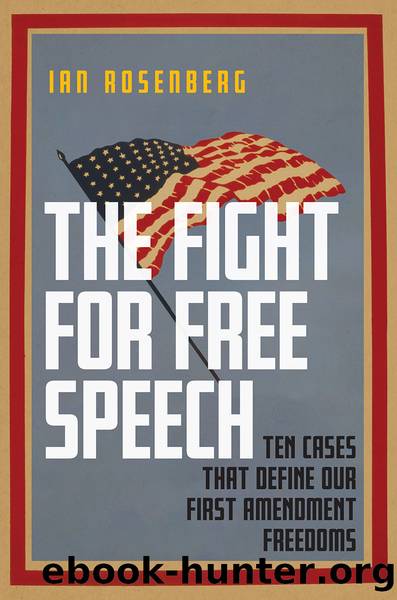The Fight for Free Speech: Ten Cases That Define Our First Amendment Freedoms by Ian Rosenberg

Author:Ian Rosenberg [Rosenberg, Ian]
Language: eng
Format: epub
Tags: Civil Rights, Constitutional, POL000000 Political Science / General, law
ISBN: 9781479801565
Google: GNbaDwAAQBAJ
Publisher: NYU Press
Published: 2021-02-09T23:51:33.513747+00:00
Hustler seems to me to have one sentence that is key to the whole decision, and it goes like this. It says: âOutrageousness in the area of political and social discourse has an inherent subjectiveness about it which would allow a jury to impose liability on the basis of the jurorsâ tastes or views or perhaps on the basis of their dislike of a particular expression.â . . . How is that sentence less implicated in a case about a private figure than in a case about a public figure?
Summers replied by saying the parody in Hustler was a âtraditional area of public discourse,â as opposed to âa private funeral.â73 However, this seemed to do little to assuage Kaganâs concern about the dangers inherent in giving juries free reign to punish unpopular speech about matters of public interest.
The questioning by most of the other justices showed they were also very concerned about how to draw a line that would allow Snyder to obtain monetary damages without leading to a chilling impact on too much other speech.74 Summers, responding haltingly and with a quavering voice, seemed cowed and largely unable to provide any substantive First Amendment framework that would accommodate Snyder.
Margie Phelps was in for an equally rough time before the justices, and got only one sentence out before she was interrupted with a series of hypotheticals. Justice Samuel Alito posed one that involved an individual who âbelieves that African Americans are inferior, they are inherently inferior, and they are really a bad influence on this country. And so [that] person comes up to an African American and starts berating that person with racial hatred. . . . Thatâs a matter of public concern?â Ms. Phelps replied that she thought âthe issue of race is a matter of public concern,â but that âapproaching an individual up close and in their grill to berate them gets you out of the zone of protection, and we would never do that.â75
Justice Anthony Kennedy then challenged her seemingly unlimited definition of public concern, saying Phelpsâs answer
Download
This site does not store any files on its server. We only index and link to content provided by other sites. Please contact the content providers to delete copyright contents if any and email us, we'll remove relevant links or contents immediately.
Killers of the Flower Moon by David Grann(3228)
Machine Learning at Scale with H2O by Gregory Keys | David Whiting(2269)
Will by Will Smith(2033)
Guns, Germs and Steel by Diamond Jared(1876)
Borders by unknow(1780)
The Room Where It Happened by John Bolton;(1718)
The Color of Law by Richard Rothstein(1574)
Once Upon a Broken Heart by Stephanie Garber(1472)
Water Rights and the Environment in the United States by John Burch(1414)
Examples & Explanations: Administrative Law by William F. Funk & Richard H. Seamon(1324)
Friends, Lovers, and the Big Terrible Thing by Matthew Perry(1324)
A Short History of War by Jeremy Black(1295)
Pharmacy Practice and The Law by Richard Abood(1252)
HBR's 10 Must Reads 2022 by Harvard Business Review(1251)
That Every Man Be Armed by Stephen P. Halbrook(1236)
The Strength In Our Scars by Bianca Sparacino(1234)
The Guarded Gate by Daniel Okrent(1219)
515945210 by Unknown(1205)
Injustices by Ian Millhiser(1197)
